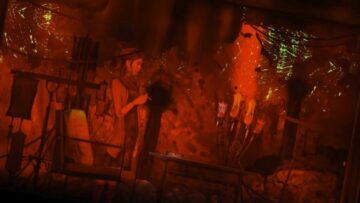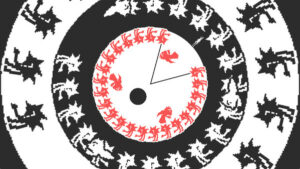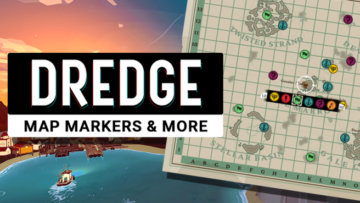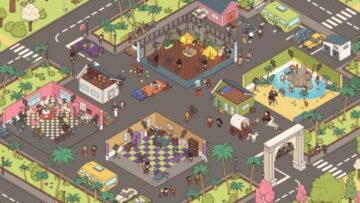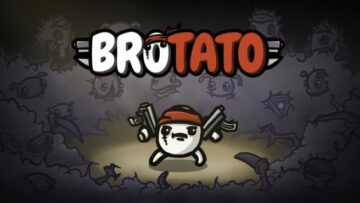System: Switch
Release date: March 5, 2024
Developer: Eyeguys / Lorenzo Redaelli
Publisher: Santa Ragione
Mediterranea Inferno is an intense visual novel to play through; despite technically being a slice-of-life story, it revels in its own nihilism and hedonism relentlessly, never letting up during its short runtime. Well, at least some of that nihilism seems to have rubbed off on me by the end of my playthrough, as I found myself wondering: what was the point of witnessing all of the suffering that Mediterranea Inferno so eagerly shovels at the player? For a game seemingly so focused on trying to utter profound social commentary on heavy themes like sexuality, psychological abuse and mental trauma, it disappointingly seems to have little to say beyond depicting just how low people can stoop and how crappy they can be to each other. A strong sense of visual identity aside, Mediterranea Inferno was a game that I actively did not enjoy experiencing, and I struggle to understand who this story is even for.
Mediterranea Inferno follows the lives of three gay men – Claudio, Andrea, and Mida – who are struggling to ground themselves, and their fading friendship, in the wake of the covid-19 pandemic after its peak in 2020. At one point when they were younger, the three of them were known as “The Sun Guys” in the Italian nightlife scene, a seemingly inseparable trio of rowdy clubgoers who had managed to make a name for themselves. But after the pandemic forced them all into isolation, the three drifted apart. The game picks up a few years down the road, with the trio apprehensively deciding to reconnect by taking a short vacation to the Mediterranean coast, where they plan to stay at Claudio’s late grandfather’s home and engage in a long weekend of debauchery together. As their selfish desires begin to conflict, old grudges and traumas threaten to resurface – depending on how the player decides to let the group spend their time, that is.
I think most players will be able to read that narrative premise and almost immediately determine whether or not this is the type of game they might enjoy. For my part, I’m generally open-minded to games that are trying to tell a story that’s atypical, and Mediterranea Inferno is certainly that. The pandemic wasn’t really all that long ago, and for some, the sense of loneliness and hopelessness that came alongside all those events was a very real and tangible thing. I admire the narrative conceit of trying to unpack mental health concerns that were compounded by such a wide-reaching and rare global event. Doing so through the lens of an LGBTQ cast is commendable; I’m a bisexual man, and I’ve certainly experienced my share of anxieties and insecurities over the course of my life as I tried to come to terms with my identity, so I’m all for shining more light on that reality. That’s why I was so disappointed that instead of telling that story, Mediterranea Inferno almost immediately goes completely off the rails – and not in a good way.
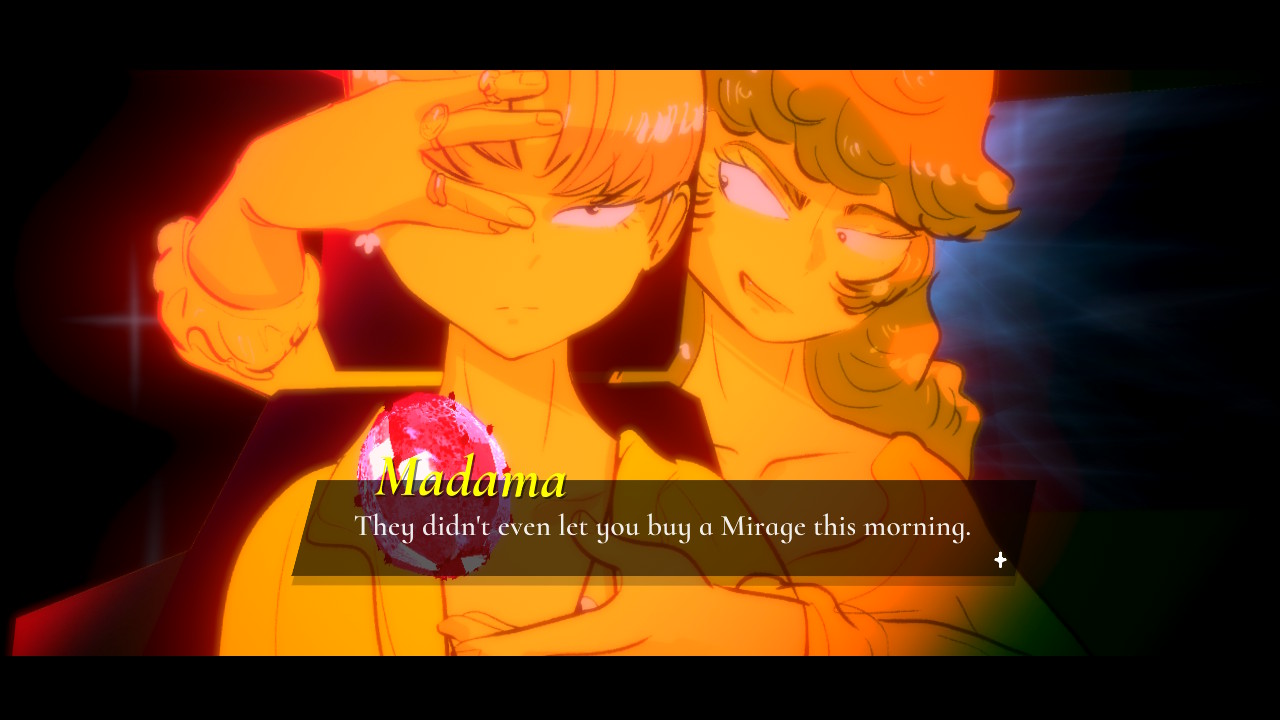

To be blunt, Claudio, Andrea, and Mida are all horrible people. They are relentlessly selfish, mostly treat each other like crap, and often act like utter sociopaths. They lie to each other, abuse each other, and seem to be primarily driven by their insatiable desires for various adult pleasures, to the point where little else is of concern. Mida is a little more fleshed-out, with his driving personality trait being his insatiable ego, and while it’s something of a coping mechanism for him it doesn’t change the fact that he’s an asshole. There are some mild attempts here and there to paint the cast as more complex than they appear, but they generally fell flat for me, seeming more like tacked-on appeals to the player’s rapidly fading empathy rather than actual meaningful character development. Sorry, but it’s difficult to care about Claudio’s half-hearted interest in his family’s history when ten minutes earlier he was voyeuristically watching two men have sex in a changing room. And if you think that seems graphic, then you’ll probably want to keep your distance from this game. I’m no prude, and some of what’s depicted really made me uncomfortable – more than I expected going in.
The game tries to make the argument that this is all kind of the point. Mediterranea Inferno opens with an author’s note that tries to lay out the game’s ambitions. “This game is meant to be a reflection on contemporary anxiety and temptations,” it says, “exposing vices and contradictions of my generation through exaggerated depictions.” This certainly aligns with the actions of the Sun Guys, who generally fail to recognize that each foray into twisted fantasy that they take is slowly making matters worse for them and not addressing any of the roots of their insecurities – both those in their general lives, and those concerning one another. The ultimate outcome, at least for me, was that Mediterranea Inferno made it really hard for me to care about its protagonists, and even when I stumbled across what I presume was meant to be the game’s darkest and most tragic ending, all I really felt was relief that it was over. Because really, if they had just done the thing that most people are perfectly capable of doing – having a modicum of self-reflection and, you know, communicating with each other – pretty much all of the tension they’re experiencing could have been avoided. But things wouldn’t be as dramatic that way, would they?
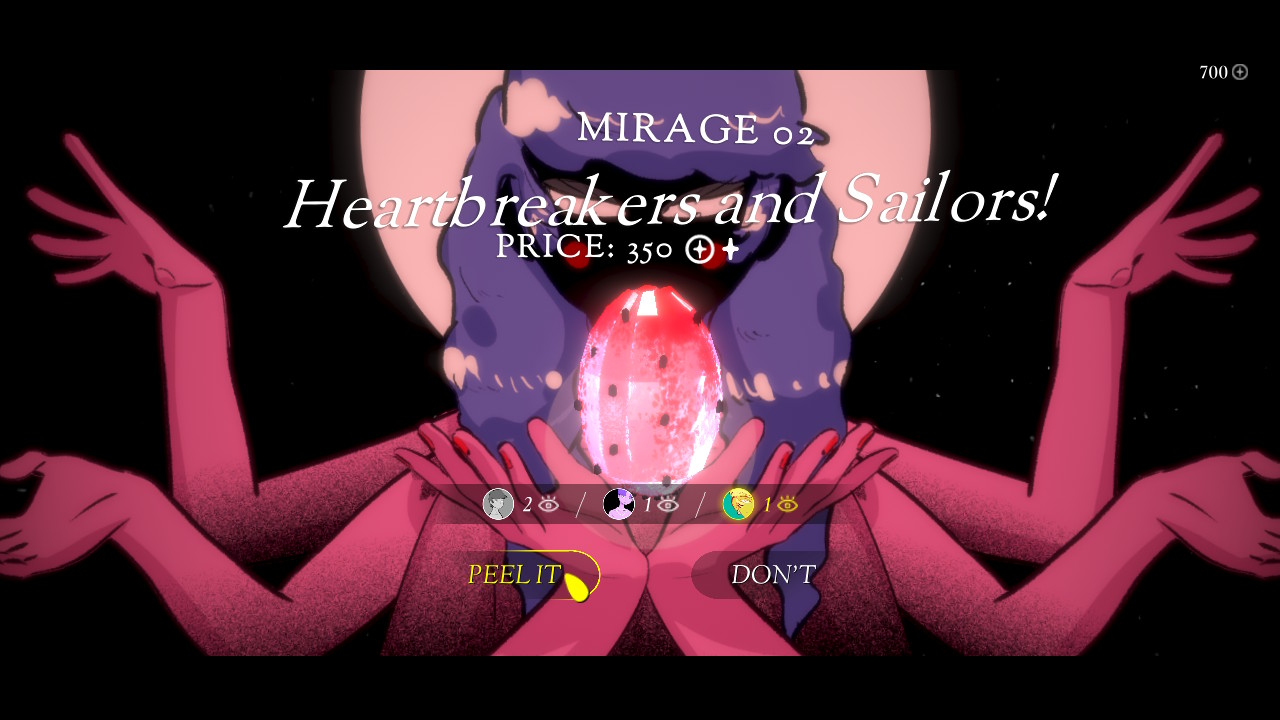

The game does posit elements of player choice, so maybe some of this is my fault. Each day, the player will have to decide how the group spends their time together. One of them might want to go the beach to go lust over some guys, while the the other might want to hang back and spend time at the pool and wallow in self-pity. Sometimes, these choices feel pretty insignificant in the moment, but they have a big impact. Depending on where the player chooses to send the group of frenemies, one of them will have an opportunity to indulge in a Mirage, a trippy nightmare-esque sequence that represents a manifestation of the individual’s twisted desires. There’s a supernatural element at play here; a mysterious being named Madama says that whoever experiences four mirages by the end of the weekend will be able to “ascend to Heaven,” without explaining at the outset what will happen to those who fail to complete the task. Each Mirage is a sort of small point-and-click environment, with different objects and people to interact with. Players can try and rush towards finding an exit, or they can stay and indulge the visiting Sun Guy in some of the temptations available there. Which Mirages the player enters, and who they belong to, plays a big role on which ending the player will get their first time around. These vignettes are fine, and they do provide a little more insight into the minds of the characters, but a good number of the Mirages I encountered felt more like they were more concerned with being edgy than anything else.
The writers chose to set Mediterranea Inferno during the Italian holiday of Ferragosto, which is a significant part of Italian culture, and has extra meaning for some devout Catholics – as I understand it, anyways. The Mirages lean into this imagery hard. You enter a Mirage by peeling and eating what’s basically the equivalent of the biblical Forbidden Fruit; once inside, you’ll likely see surreal and mild bastardizations of religious icons and symbols, from all-seeing confession boxes to depictions of one of the Sun Guys being crucified. This, I feel, is when the game comes closest to saying something meaningful; here I felt it was addressing the repressed feelings of shame that some LGBTQ-identifying individuals feel when being raised in strict faith-based environments. I can understand that particular sentiment, because I’ve been there, personally. It’s a reminder that while the Mirages act as a sort of outlet for the Sun Guys in Mediterranea Inferno, they’re all still carrying some deep-seated trauma with them. I guess that’s something, but the game’s writing never really takes it beyond that cursory level of, “wow, that’s really rough!” A similar thing can be said about how the game portrays technology, so keen to point out how mindlessly we all post online without reading the terms and conditions and signing our lives away, but never really addressing what the repercussions of that might be. I don’t want to imply that Mediterranea Inferno doesn’t have some good ideas, because it does. It just doesn’t give its heavy themes and beautifully written prose enough room to breathe and develop into something meaningful.


One thing’s unfortunately certain: Mediterranea Inferno certainly isn’t going to win any awards for having a nuanced and sensitive view of the LGTBQ community. There is a stereotype some people have – a stereotype, to be clear, that I dislike – that gay men are sex-obsessed to the point of it being something unhealthy and perverse. It’s a harmful stereotype that, like any stereotype, shouldn’t be broadly applied to a whole group of people. Mediterranea Inferno depicts its cast of gay men exclusively in this way, and yet, part of me wants to try and give the writing the benefit of the doubt here. Again, maybe this is intentional when Mediterranea Inferno’s self-stated goal is to portray what a life of overindulgence in vices might look like. These guys are young and immature, something that definitely contributes to the choices they make. The Mirages are… well, mirages, false percepetions of reality. It might all be meant to act as a warning, albeit a pandering and played-out one. That is, if it weren’t for one specific plot point in the story – the moment it’s revealed that one of the Sun Guys has been sexually assaulting one of the other trio members in his sleep.
Now, Mediterranea Inferno doesn’t portray this action as OK, but it also doesn’t depict any real, tangible consequence for it either – even despite the assaulter getting caught by his other friend. It’s brushed aside from the narrative entirely, and is literally not brought up again. Up until this point in the narrative, I had bought into the idea that maybe Mediterranea Inferno was trying to utter some social commentary that I just wan’t full grasping – that maybe, deep down, this game had something important to say. After this happened, though, I realized that Mediterranea Inferno’s narrative really had no idea what story it was trying to tell, and was just trying to elicit a shock reaction. Why else portray one of the game’s few characters as a pervert, make me despise them even more, and then pretend like it never happened?


This is all a real shame, because if it weren’t for everything about this game that I so staunchly disliked, it’d likely win me over thanks to its creative art direction, which adds some serious pop-art and graphic novel flair to a genre that often stagnates. The sparse environments of the Italian coast are here often bathed in high-contrast, sinister lighting that bathes everything onscreen in an unsettling red glow; when night falls, the world feels truly oppressive and void. It’s certainly not a place I’d like to visit, meaning the art is is remarkably effective at complimenting Mediterranea Inferno’s themes and vibe. The Mirages, while just as disconcerting, tend to contrast the “real world” segments by being much more detailed in their artwork, feeling at times like strolling through a carnival of lights that’s more lively than what’s going on in reality. The game’s soundtrack is also effective, ramping up the creepy synth sounds and slowly-pulsating distortions right as narrative tension peaks. Unfortunately, none of that is enough to make the story itself land better, and in a visual novel, that’s usually my main concern.
The Verdict
Mediterranea Inferno is a game that revels in relentless misery, and while it seemingly attempts to make a social commentary about the dangers of succumbing to a life built around unhealthy fantasies, all it really managed to do was make me hate everyone who was in it and not really care what happened to them. I don’t mind a bleak narrative, but there has to be a point to it beyond pointing out how horrible people can be, and ultimately, I felt that the game never really managed to say anything beyond that. If it’s all meant to be a cautionary tale about living a life of excess, than I suppose it does that, but without really offering any hope for a better alternative. Maybe all this will connect with someone, but the more time I spent playing Mediterranea Inferno, the more eager I was to finish it so I could go live in the real world again – one that I truly hope isn’t quite as harsh and cold as the one depicted here.
Mediterranea Inferno copy provided by the publisher for the purposes of this review.
Related
- SEO Powered Content & PR Distribution. Get Amplified Today.
- PlatoData.Network Vertical Generative Ai. Empower Yourself. Access Here.
- PlatoAiStream. Web3 Intelligence. Knowledge Amplified. Access Here.
- PlatoESG. Carbon, CleanTech, Energy, Environment, Solar, Waste Management. Access Here.
- PlatoHealth. Biotech and Clinical Trials Intelligence. Access Here.
- Source: https://nintendoeverything.com/rapid-review-mediterranea-inferno/
- 1
- 2020
- 300
- a
- able
- About
- abuse
- across
- act
- Action
- actions
- Actively
- actual
- Addressing
- adds
- after
- again
- ago
- aligns
- All
- almost
- alongside
- also
- alternative
- ambitions
- an
- and
- Another
- Anxiety
- any
- Anything
- apart
- appeals
- applied
- ARE
- argument
- around
- Art
- artwork
- as
- aside
- At
- attempts
- available
- awards
- away
- back
- BE
- Beach
- beautifully
- because
- been
- begin
- being
- Belong
- benefit
- Better
- beyond
- BIG
- both
- bought
- boxes
- BREATHE
- broadly
- brought
- built
- but
- by
- came
- CAN
- capable
- care
- carnival
- carrying
- caught
- certain
- certainly
- change
- changing
- character
- characters
- choice
- choices
- chooses
- chose
- clear
- cold
- come
- comes
- commendable
- Commentary
- community
- complete
- completely
- complex
- complimenting
- compounded
- concern
- concerned
- concerning
- concerns
- conditions
- conflict
- connect
- consequence
- contemporary
- contrast
- contributes
- copy
- could
- course
- COVID-19
- COVID-19 pandemic
- Creative
- Culture
- dangers
- date
- day
- decide
- deep
- definitely
- depending
- depicted
- desires
- despite
- detailed
- determine
- develop
- Development
- DID
- different
- difficult
- direction
- disappointed
- distance
- do
- does
- doing
- done
- Doubt
- down
- dramatic
- driven
- driving
- During
- each
- eager
- eagerly
- earlier
- Effective
- ego
- either
- element
- elements
- else
- Empathy
- end
- ending
- engage
- enjoy
- enough
- Enter
- Enters
- entirely
- Environment
- environments
- equivalent
- even
- Event
- events
- everyone
- everything
- excess
- exclusively
- Exit
- expected
- experienced
- Experiences
- experiencing
- explaining
- extra
- fact
- Fail
- falls
- false
- FANTASY
- fault
- feel
- feelings
- feels
- felt
- few
- finding
- fine
- finish
- First
- first time
- flair
- focused
- follows
- For
- foray
- forced
- found
- four
- friend
- Friendship
- from
- full
- game
- Games
- General
- generally
- generation.
- Genre
- Get
- getting
- give
- Global
- go
- goal
- goes
- going
- good
- graphic
- Ground
- Group
- guess
- had
- happen
- happened
- Hard
- harmful
- has
- hate
- Have
- having
- he
- Health
- heavy
- here
- him
- his
- history
- holiday
- Home
- hope
- How
- HTTPS
- i
- icons
- idea
- ideas
- Identity
- if
- immediately
- Impact
- important
- in
- individuals
- indulge
- Inferno
- INSIDE
- insight
- instead
- intense
- intentional
- interact
- interest
- into
- Is
- isolation
- IT
- Italian
- ITS
- itself
- jpg
- just
- keen
- keep
- kind
- know
- known
- Land
- late
- lay
- least
- Lens
- let
- Level
- LGBTQ
- lie
- Life
- light
- Lighting
- like
- likely
- Little
- Live
- lives
- living
- Loneliness
- Long
- Look
- Low
- made
- main
- make
- Making
- man
- managed
- Matters
- maybe
- me
- meaning
- meaningful
- meant
- mechanism
- Mediterranean
- Members
- Men
- mental
- Mental health
- might
- mind
- minds
- minutes
- Mirage
- moment
- more
- most
- mostly
- much
- my
- myself
- mysterious
- name
- named
- narrative
- never
- Night
- no
- None
- not
- note
- novel
- nuanced
- number
- objects
- of
- off
- offering
- often
- Old
- on
- once
- One
- online
- opens
- Opportunity
- or
- Other
- our
- out
- Outcome
- outlet
- over
- own
- paint
- pandemic
- part
- particular
- peak
- People
- perfectly
- Personality
- personally
- place
- plan
- plato
- plato data intelligence
- platodata
- platogaming
- play
- player
- players
- Playing
- plays
- plot
- Point
- pool
- portrays
- post
- pretty
- primarily
- probably
- profound
- Provide
- provided
- psychological
- Publisher
- purposes
- quite
- rails
- raised
- ramping
- rapidly
- Rare
- rather
- reaction
- read
- Reading
- Real
- real world
- Reality
- realized
- really
- recognize
- reconnect
- red
- reflection
- relentless
- relentlessly
- relief
- reminder
- represents
- Revealed
- review
- right
- road
- role
- room
- roots
- runtime
- rush
- Said
- Santa
- say
- saying
- says
- scene
- see
- seem
- seemingly
- seems
- segments
- send
- sense
- sensitive
- sentiment
- sequence
- serious
- set
- Sex
- Share
- shining
- Short
- significant
- signing
- similar
- sleep
- small
- So
- Social
- some
- someone
- something
- sometimes
- sounds
- Soundtrack
- specific
- spend
- spends
- spent
- stay
- still
- Story
- strict
- strong
- struggle
- struggling
- succumbing
- such
- suffering
- sun
- supernatural
- Take
- takes
- taking
- tale
- tangible
- task
- technically
- Technology
- tell
- telling
- ten
- tend
- terms
- terms and conditions
- than
- thanks
- that
- The
- The Game
- the world
- their
- Them
- themes
- themselves
- then
- there
- These
- they
- thing
- things
- think
- this
- those
- though
- threaten
- three
- Through
- time
- times
- to
- together
- towards
- treat
- tried
- trio
- truly
- try
- trying
- two
- type
- ultimate
- ultimately
- Understand
- unfortunately
- until
- up
- usually
- vacation
- various
- very
- Vibe
- View
- Visit
- visual
- Visual identity
- Visual Novel
- wake
- want
- wants
- warning
- was
- watching
- way
- we
- weekend
- well
- were
- What
- when
- where
- whether
- while
- WHO
- whoever
- whole
- why
- will
- win
- with
- without
- witnessing
- wondering
- world
- worse
- would
- writers
- writing
- written
- years
- yet
- you
- young
- your
- zephyrnet
![[Review] Mediterranea Inferno](https://platogaming.com/wp-content/uploads/2024/03/review-mediterranea-inferno-scaled.jpg)

